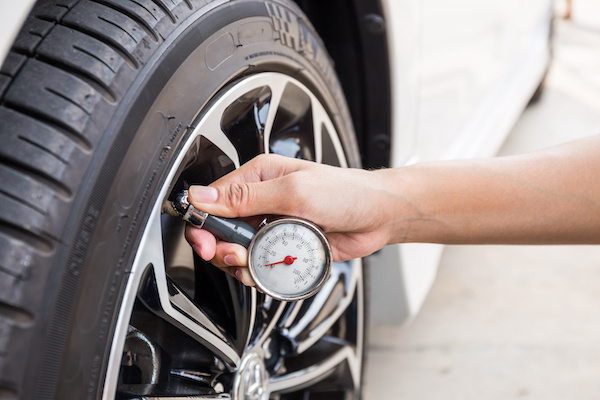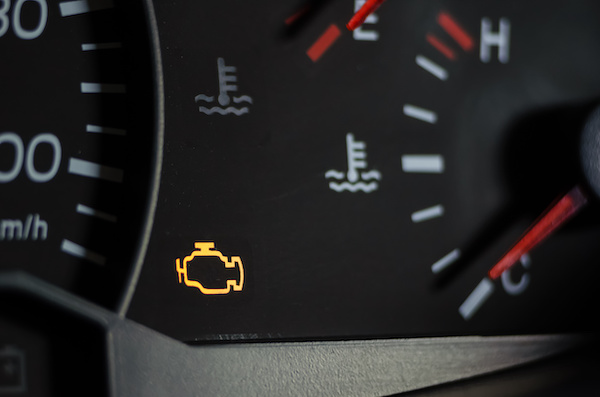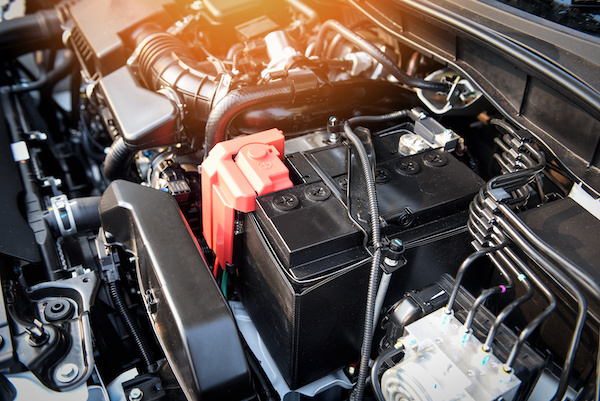Posted on 10/25/2021

With Fall finally here, it's the perfect time to give your tires some love. Your tires are essential to the performance, safety, and even fuel economy of your vehicle. There are various services and maintenance practices you should do to keep your rubber wheels healthy and safe. 1 - Check the Air Pressure Proper air inflation is key when it comes to your tires. With the right amount of air in your tires, they will last longer, wear more evenly, and possibly even improve your gas mileage. To find the factory-recommended tire air pressure, please look in your owner's manual or the driver's door frame sticker. Once you measure your tires with a gauge, you can judge whether or not you need to add more air. Some people like to overinflate the tires for an extra "cushion," but doing so can do more harm than good. Both underinflated and overinflated tires can lead to premature wear of your tires. 2 - Measure Tread Depth Tread is the next most important thing to check ... read more
Posted on 9/28/2021

Many vehicle accidents take place at night. There are a lot of factors that come into play, but a big reason why people get into accidents at night is vision impairments. There are several steps you can take to make sure you can see as much as possible when you're driving in the dark: Keep a clean windshield/windscreen. Glares from oncoming vehicles can disguise other obstacles on the road. To ensure the safest ride possible, take time to wipe off that film that gets built up on the inside of your windshield. You should also make sure your wipers are in good condition and have enough wiper fluid in your car. Make Sure Your Headlights Are Working at 100% Brightness. When the sun starts to set, we depend entirely on our headlights to see where we are going. If you've noticed that your headlights aren't as bright as they used to be, then you may need to have them replaced. It's natural for the bulbs to dim down over time, but you should swap them out every sever ... read more
Posted on 8/23/2021

Your car's engine is likened to the heart of your vehicle, and it's one of its most significant parts. The check engine light is connected to your car's onboard diagnostic system alerting you of any problems, and it's usually yellow or red depending on your vehicle. It's always dreadful for many drivers when the engine light turns on, but you shouldn't panic. However, with your check engine light on, it's vital to try and avoid driving. The check engine light and other warning signals indicate an underlying problem in your vehicle that you shouldn't ignore. When the check engine light turns on, remain calm and make a quick assessment of the situation to determine your next move. Why You Shouldn't Drive with the Check Engine Light On The check engine light could be pointing to a small or a big issue in your car. If the light turns on and keeps flashing, it signals a severe problem. You should stop your vehicle immediately, evaluate the situation, a ... read more
Posted on 7/26/2021

Most of us relish the summertime. Whether it is a cross-country road trip or a beach vacation, we have plans that we've been looking forward to for months! Unfortunately, your car batteries might not share the same feelings. The endless summer heat can quickly take a toll on your battery and thus spoil all the fun. With more care and maintenance, your car battery will be healthy and fit to go every time you turn on the ignition. Here are some excellent maintenance tips to help your car battery withstand the hot summer temperatures: 1. Clean Your Battery Terminals Over time, dirt and corrosion may accumulate around your car battery terminals, dramatically reducing its performance. Corrosion is a poor heat conductor, meaning that it will prevent a free flow of current. In severe circumstances, it can stop your battery altogether. Dirt, on the other hand, will quickly drain your battery current even quicker. Luckily, a quick visit to our shop will get this problem fixed and get you ... read more
Posted on 6/23/2021

So you have a graduate in your life who has done well and made you proud. Well, with outstanding achievements comes great reward. So whether you are gifting your child or a younger sibling, a new set of wheels is a fantastic way of introducing them into the world with extra support and enthusiasm. All the same, having these overly essential accessories will help upgrade the vehicle offering them an incredible experience. Must-Have Accessories for A New Car Jump Starter Your car will most likely fail you at the most inconveniencing hours, and let's face this can get quite frustrating and annoying. His is especially common during those freezing winter mornings when your car engine freezes up or the battery dies. At that moment, having a jumpstart to help you start and get your car moving becomes a matter of urgency. When purchasing a jump starter, go for the latest versions, as they come with extra features that will definitely save you time and money. Phone Mount A phone mount ... read more
Posted on 5/25/2021
.jpeg)
Part of owning a car is dealing with the routine maintenance and adjustments that need to be done. It's important that you pay attention and are familiar with your vehicle so you can recognize when something is wrong, as well as making sure you get it serviced regularly. What Are Shock Absorbers? One of the parts of any vehicle that needs to be replaced once in a while is the shock absorbers. These are basically small oil pumps that help to absorb the shock of hitting bumps and uneven roads as you are driving, so the people in the car don't get jostled. The shock absorbers control the amount of fluid in the piston to ease the abruptness of the motion when the car hits a dip or bump. How Long Do They Last? Most shock absorbers will last for approximately 50,000 miles, although this is an estimate and can vary by the vehicle, and even the driver. If you frequently travel rough terrain or have a habit of driving without braking when needed, your shock absorbers will not last a ... read more
Posted on 4/23/2021
.jpeg)
Automotives such as cars, trucks, and buses facilitate transportation but have also proven to be harmful because of the smoke they emit, violating the clean air act. A catalytic converter is a pollution-reducing unit found in some modern automotive that turns pollutants into harmless gases, including steam. It's installed inside the exhaust system of your vehicle or truck with a chemical catalyst, either Palladium or Platinum mixtures. The chemicals are responsible for converting detrimental emissions into eco-friendly gases. The following are some of the symptoms that will show your vehicle's catalytic converter is faulty. Poor Engine Performance When your engine is not operating efficiently, one of the reasons for its performance failure might be a defective catalytic converter. If it's clogged, the catalytic converter will reduce the engine's performance by reducing its acceleration, power, and fuel levels. In case your engine starts to malfunc ... read more
Posted on 3/17/2021
.jpeg)
The battery is an integral part of your vehicle. It is part of the engine's starting system and powers all the electrical systems in your car. Therefore, without a battery that functions well, you will have problems enjoying nearly all your vehicle's features. A battery can last for up to six years if operating in the ideal conditions (not in extreme temperatures and lots of moisture). Unfortunately, the conditions are never this perfect, and most car owners need to change batteries every three to five years. Signs that You Need to Change the Battery Here are a few indicators that your battery is dying. The Engine Starts Slowly Over time, the battery's internal components become less effective, causing the battery to take longer to create enough charge to start the engine. Your car may take a few seconds to a minute to start or require several keystrokes. Check Engine Light Comes On The check engine light may be trigg ... read more
Posted on 2/18/2021
.jpeg)
A bad fuel injector can lead to decreased gas mileage and occasional idling, leading to poor engine performance. That said, fuel injectors play an essential role in delivering engine fuel to guarantee optimum combustion. Obtaining efficient function may become a challenge with a faulty or clogged fuel injector. And so, regular maintenance and the knowledge to spot signs of a defective fuel injector will come in handy for most car owners. How to Detect a Dirty Fuel Injector It would help if you strived to detect a bad fuel injector to invest in prompt cleaning for a smooth and carefree car. Always remember that if one of your injectors malfunctions, then your car would not perform optimally. Therefore, if you experience the following, it is time to visit your mechanic to clean your injectors. 1. Engine Stalls or Rough Idle If the vehicle often sputters and shakes when you are idling at the stop sign or in traffic, this is one sign that the fuel injector is malfunctioning. The engine ... read more
Posted on 1/21/2021
.jpeg)
It is so important to keep your car maintained well and working properly. This will help it stay in good working order for longer, saving you money and preventing any major accidents while you are on the road. Getting your vehicle inspected often is one of the best ways to catch problems early on. Some common components of your vehicle that you should inspect include: The Radiator It is a good idea to replace the radiator twice a year. Do an extra inspection if you notice there is a big problem with it. Check the hoses and caps for any erosion. When the car is parked, check for any radiator fluid that leaks out. The Rotors and Brakes Brakes are something that you should check out every 10,000 miles, every three months, or if you feel like something is wrong with them. You want the rotors to be smooth without any deep grooves. If you need the brakes changed out, visit a repair shop to get it handled. The Cooling and Heating Unit These should be checked with the changing seasons. T ... read more